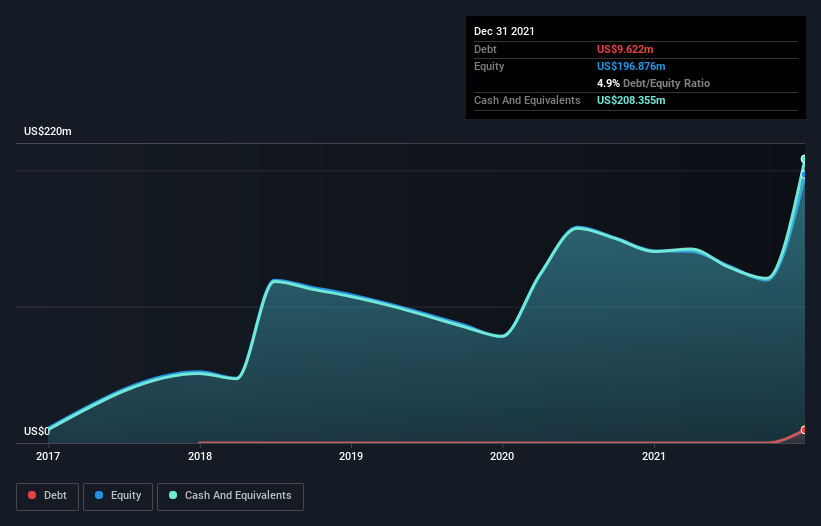Health Check: How Prudently Does Kezar Life Sciences (NASDAQ:KZR) Use Debt?
David Iben put it well when he said, 'Volatility is not a risk we care about. What we care about is avoiding the permanent loss of capital.' So it seems the smart money knows that debt - which is usually involved in bankruptcies - is a very important factor, when you assess how risky a company is. We note that Kezar Life Sciences, Inc. (NASDAQ:KZR) does have debt on its balance sheet. But the real question is whether this debt is making the company risky.
When Is Debt Dangerous?
Debt assists a business until the business has trouble paying it off, either with new capital or with free cash flow. Part and parcel of capitalism is the process of 'creative destruction' where failed businesses are mercilessly liquidated by their bankers. However, a more common (but still painful) scenario is that it has to raise new equity capital at a low price, thus permanently diluting shareholders. By replacing dilution, though, debt can be an extremely good tool for businesses that need capital to invest in growth at high rates of return. The first step when considering a company's debt levels is to consider its cash and debt together.
View our latest analysis for Kezar Life Sciences
How Much Debt Does Kezar Life Sciences Carry?
The image below, which you can click on for greater detail, shows that at December 2021 Kezar Life Sciences had debt of US$9.62m, up from none in one year. But it also has US$208.4m in cash to offset that, meaning it has US$198.7m net cash.
A Look At Kezar Life Sciences' Liabilities
Zooming in on the latest balance sheet data, we can see that Kezar Life Sciences had liabilities of US$8.21m due within 12 months and liabilities of US$12.8m due beyond that. On the other hand, it had cash of US$208.4m and US$70.0k worth of receivables due within a year. So it actually has US$187.4m more liquid assets than total liabilities.
This surplus liquidity suggests that Kezar Life Sciences' balance sheet could take a hit just as well as Homer Simpson's head can take a punch. With this in mind one could posit that its balance sheet means the company is able to handle some adversity. Simply put, the fact that Kezar Life Sciences has more cash than debt is arguably a good indication that it can manage its debt safely. When analysing debt levels, the balance sheet is the obvious place to start. But it is future earnings, more than anything, that will determine Kezar Life Sciences's ability to maintain a healthy balance sheet going forward. So if you're focused on the future you can check out this free report showing analyst profit forecasts.
Given its lack of meaningful operating revenue, Kezar Life Sciences shareholders no doubt hope it can fund itself until it has a profitable product.
So How Risky Is Kezar Life Sciences?
By their very nature companies that are losing money are more risky than those with a long history of profitability. And the fact is that over the last twelve months Kezar Life Sciences lost money at the earnings before interest and tax (EBIT) line. Indeed, in that time it burnt through US$43m of cash and made a loss of US$55m. But the saving grace is the US$198.7m on the balance sheet. That means it could keep spending at its current rate for more than two years. Even though its balance sheet seems sufficiently liquid, debt always makes us a little nervous if a company doesn't produce free cash flow regularly. When analysing debt levels, the balance sheet is the obvious place to start. But ultimately, every company can contain risks that exist outside of the balance sheet. For example Kezar Life Sciences has 5 warning signs (and 2 which are a bit unpleasant) we think you should know about.
If, after all that, you're more interested in a fast growing company with a rock-solid balance sheet, then check out our list of net cash growth stocks without delay.
Have feedback on this article? Concerned about the content? Get in touch with us directly. Alternatively, email editorial-team (at) simplywallst.com.
This article by Simply Wall St is general in nature. We provide commentary based on historical data and analyst forecasts only using an unbiased methodology and our articles are not intended to be financial advice. It does not constitute a recommendation to buy or sell any stock, and does not take account of your objectives, or your financial situation. We aim to bring you long-term focused analysis driven by fundamental data. Note that our analysis may not factor in the latest price-sensitive company announcements or qualitative material. Simply Wall St has no position in any stocks mentioned.

